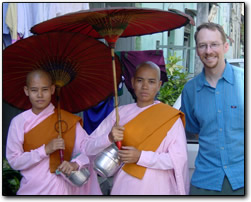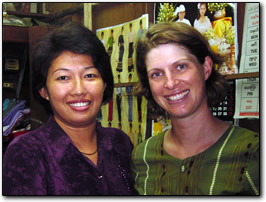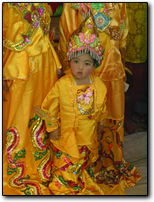
Yangon (Rangoon)
Because of Myanmar's isolation, there are no ATMs, nor are credit cards or even travelers' checks generally accepted. To get Burmese “kyat” (pronounced “chat”) at a decent rate we had to change our US dollars, fresh from the bank in Thailand, on the black market. As soon as we arrived in Yangon we started asking the going daily exchange rate. Once we found a money changer who seemed reputable and who could give us a good rate, we flashed our 100-dollar bills and he rushed off to get his stash. One hundred American dollars resulted in a thick stack of bills: 88 times 1,000 (the largest denomination) totaling 88,000 kyat. Fumbling with the oversized bills, we counted it the best we could. Not having seen Burmese money before, we didn't really know for sure that the bills were legal. After changing 300 dollars, we had so much kyat that we didn't know where to hide it. One of our crisp 100-dollar bills was rejected by the changer because the serial number had a “CB” in it. A rumor held that these bills were fakes. Our changer did not want to take the risk. Even though the watermark and metal strip were plainly visible, he wouldn't touch it. At another location, a different changer gave us a very good rate. He returned with stacks of bills folded in groups of 10. He deftly demonstrated that by counting the groups of 10, each folded into a further 10 bills, there were indeed 8, making 800. We counted it ourselves, but something didn't seem right, so we unfolded the bills, restacked them and counted them one by one. Sure enough, we ended up 10 bills short! The changer, seeing that his clever ruse had fallen through, grabbed his money and made a hasty exit, saying that he would return with the missing bills in a few minutes. Luckily our dollars were still stashed deep within our pockets.
 |
 |
